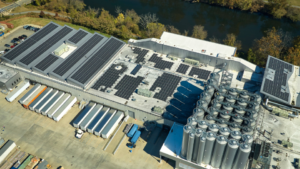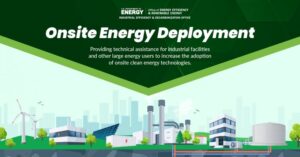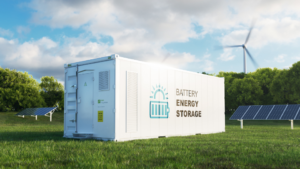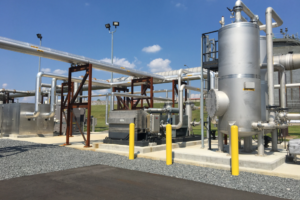Transforming Industrial Energy Consumption: NCCETC’s Commitment to Pioneering Clean Power & Energy Efficiency
 Energy consumption in the United States is notably shaped by its industrial and commercial sector users, which currently accounts for one-third of the nation’s total energy usage as reported by the Energy Information Administration (EIA). Within this sector, energy-intensive industries play a pivotal role, consuming substantial amounts of energy in the transformative processes of raw materials into essential products like aluminum, chemicals, forest products, glass, metals, mining and petroleum refining.
Energy consumption in the United States is notably shaped by its industrial and commercial sector users, which currently accounts for one-third of the nation’s total energy usage as reported by the Energy Information Administration (EIA). Within this sector, energy-intensive industries play a pivotal role, consuming substantial amounts of energy in the transformative processes of raw materials into essential products like aluminum, chemicals, forest products, glass, metals, mining and petroleum refining.
At the forefront of initiatives to mitigate energy intensity is the North Carolina Clean Energy Technology Center (NCCETC). Our dedicated team offers comprehensive technical services focused on energy efficiency, encompassing overall management, training initiatives and on-site assessments. These services extend to commercial, industrial and institutional facilities across the Southeastern United States to support a new era of enhanced energy performance and on-site energy generation.
Commercial and industrial firms in North Carolina, as significant energy consumers, play a crucial role in advancing the transition to renewable energy sources. This shift is essential to foster the successful transition to an economy increasingly based on renewable energy. Not only does this transformation enhance the environmental and economic sustainability of the state’s industries, but it also fosters growth in the renewable energy sector, retains energy dollars within the state, and boosts employment opportunities in the energy sector.
NCCETC first took up this challenge in 1996 with the initiation of the Commercial and Industrial Outreach Program. This program provided complimentary site visits to plants, facilities and institutional buildings to assess the economic and technical feasibility of solar applications. NCCETC staff also recruited renewable energy manufacturers and distributors to North Carolina, encouraging them to locate or expand their facilities in the state.
Today, NCCETC offers a suite of services to help industrial, commercial and institutional energy users to reach their energy-related goals through its Clean Power & Industrial Efficiency (CPIE) program. Staffed by experienced engineers, scientists and specialists, the CPIE program can provide site-specific renewable energy assessments, economic feasibility studies, and project development support.
Onsite Energy Technologies
 The Industrial Efficiency and Decarbonization Office (IEDO) within the U.S. Department of Energy (DOE) unveiled its choice of nine organizations—eight regional and one national—to form a network of Technical Assistance Partnerships (TAPs) earlier this year. NCCETC was selected to lead the DOE Southeast Onsite Energy TAP in collaboration with team members from the University of Puerto Rico Mayagüez (UPRM) and Tennessee Tech University.
The Industrial Efficiency and Decarbonization Office (IEDO) within the U.S. Department of Energy (DOE) unveiled its choice of nine organizations—eight regional and one national—to form a network of Technical Assistance Partnerships (TAPs) earlier this year. NCCETC was selected to lead the DOE Southeast Onsite Energy TAP in collaboration with team members from the University of Puerto Rico Mayagüez (UPRM) and Tennessee Tech University.
These partnerships aim to support industrial facilities and other major energy consumers in enhancing the adoption of onsite energy technologies. The overarching goal is to expedite the integration and implementation of clean energy technologies, thereby catalyzing industrial decarbonization, boosting productivity, and enhancing the competitiveness of the United States.
 “This funding will enable us to share our expertise with companies that have made commitments to reduce greenhouse gas emissions, helping them to meet their goals while saving energy and reducing operating costs by integrating onsite energy technologies,” said Isaac Panzarella, Associate Director at the NCCETC and principal investigator for the DOE Southeast Onsite Energy TAP. “Through this project we will support manufacturers on deploying a wide variety of technologies including battery storage, combined heat and power, district energy, fuel cells, geothermal, industrial heat pumps, solar, solar thermal, wind power and more.”
“This funding will enable us to share our expertise with companies that have made commitments to reduce greenhouse gas emissions, helping them to meet their goals while saving energy and reducing operating costs by integrating onsite energy technologies,” said Isaac Panzarella, Associate Director at the NCCETC and principal investigator for the DOE Southeast Onsite Energy TAP. “Through this project we will support manufacturers on deploying a wide variety of technologies including battery storage, combined heat and power, district energy, fuel cells, geothermal, industrial heat pumps, solar, solar thermal, wind power and more.”
To help facilities across the Southeast integrate onsite energy technologies, the partnerships will provide initial technical assistance that can identify appropriate and potentially feasible onsite energy opportunities, with follow up advanced analysis to support project installations, and more.
Combined Heat and Power (CHP)
In 2003, NCCETC was selected by the U.S. Department of Energy to serve as the Southeast Clean Energy Application Center, one of eight regional clean energy centers created to promote greater adoption of clean and efficient energy generation by recycling thermal energy through technologies like combined heat and power (CHP), district energy and waste heat recovery.
The DOE Southeast Clean Energy Application Center played a vital role in educating prospective adopters of clean energy, fostering clean energy technologies as viable technical and economic options in the southeast. It coordinated networks of stakeholders, worked to remove policy barriers, and leveraged existing and potential regional resources.
 Today, NCCETC continues this legacy by serving as the hub for the U.S. DOE Southeast Combined Heat and Power Technical Assistance Partnership (CHP TAP). A noteworthy success is the McAlpine Creek Wastewater Management Facility, the first wastewater treatment plant in North Carolina to install a 1 Megawatt (MW) CHP system powered by anaerobic digester gas in 2017 after receiving assistance from the NCCETC team.
Today, NCCETC continues this legacy by serving as the hub for the U.S. DOE Southeast Combined Heat and Power Technical Assistance Partnership (CHP TAP). A noteworthy success is the McAlpine Creek Wastewater Management Facility, the first wastewater treatment plant in North Carolina to install a 1 Megawatt (MW) CHP system powered by anaerobic digester gas in 2017 after receiving assistance from the NCCETC team.
The Southeast CHP TAP provided technical assistance for Charlotte Water during the planning phases of this CHP system, conducting a CHP Qualification Screening and a feasibility analysis. Charlotte Water secured a $3.2 million, 20-year loan with zero-interest under the Green Project provisions of North Carolina’s Clean Water State Revolving Fund program to finance the installation.
Shaw Industries Group, Inc. also utilized resources from the Southeast CHP TAP, including a feasibility study, to inform their decision to implement CHP at its Columbia, South Carolina fiber production facility. In 2018, Shaw Industries brought a 14.1 MW CHP system online as a part of its carbon emissions reduction strategy and to increase efficiency while controlling energy costs.
The CHP system has the capacity to meet all thermal load and most of the electric demand for the facility. Plus, the system was designed with the capability to “island”, which enables the facility to remain operational during outages or interruptions to the power supplied by the local utility.
Isaac Panzarella emphasized, “The services offered by the CHP TAP hold remarkable value, particularly in demonstrating a project’s viability and return on investment in tangible, as well as environmental benefits in measurable terms.”
If you’re interested in learning more about how CHP can benefit your facility, please contact the Southeast CHP TAP Director Isaac Panzarella at ipanzarella@ncsu.edu. Stay tuned for more information about the Southeast Onsite Energy TAP in 2024.